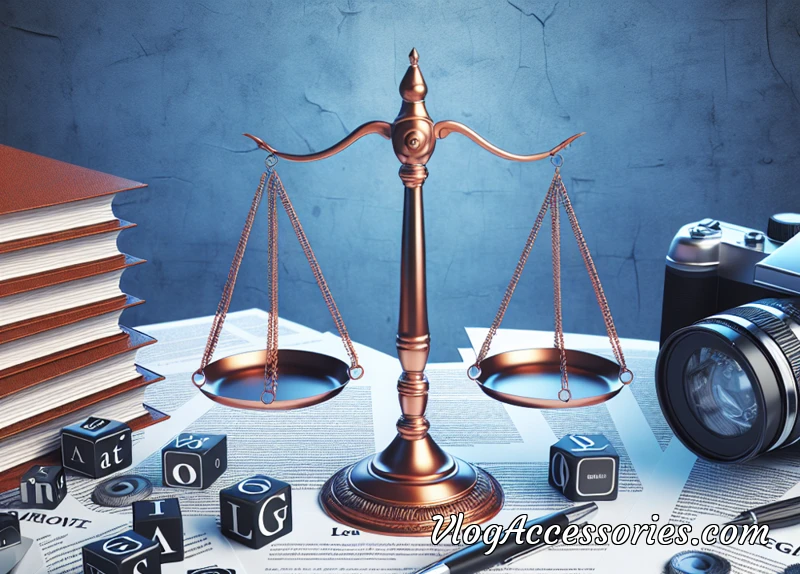Vlogging has become a popular form of content creation, allowing individuals to share their thoughts, experiences, and expertise with a wide audience. However, vloggers need to be aware of various legal considerations to avoid copyright infringement, trademark issues, and permissions violations. In this article, we will explore the key legal considerations that vloggers should keep in mind to protect their content and avoid legal troubles.
Understanding Copyrights
Copyright law protects original works of authorship, including videos, music, images, and written content. As a vlogger, it is crucial to understand that your vlogs are automatically protected by copyright as soon as they are created and fixed in a tangible medium. This means that others cannot use your vlogs without your permission.
Fair Use Doctrine
While copyright protection is important, it is essential to be aware of the fair use doctrine, which allows limited use of copyrighted material without permission for purposes such as criticism, commentary, news reporting, teaching, and research. However, determining whether a particular use qualifies as fair use can be complex and is often decided on a case-by-case basis.
Obtaining Permission
If you plan to use copyrighted material in your vlogs, such as music, images, or videos created by others, it is advisable to obtain the necessary permissions. This may involve obtaining a license, purchasing royalty-free music or images, or seeking explicit permission from the copyright owner.
Protecting Your Own Content
To protect your own vlogs from unauthorized use, consider adding a copyright notice to your videos, registering your copyrights with the relevant authorities, and monitoring for any instances of infringement. In case of copyright infringement, you may need to take legal action to enforce your rights.
Understanding Trademarks
Trademarks are used to protect brand names, logos, slogans, and other identifiers that distinguish one’s goods or services from those of others. As a vlogger, you need to be cautious about using trademarks owned by others in your vlogs without permission, as it can lead to trademark infringement.
Use of Trademarks
While mentioning a trademark in your vlogs for informational or commentary purposes may not necessarily constitute trademark infringement, using a trademark in a way that creates confusion or implies endorsement by the trademark owner can lead to legal issues. It is advisable to seek permission if you plan to use trademarks in a commercial context.
Avoiding Misrepresentation
To avoid trademark issues, be careful not to misrepresent your vlogs as being affiliated with or endorsed by a trademark owner when they are not. This can damage the reputation of the trademark owner and result in legal consequences for you as a vlogger.
Trademark Searches
If you plan to create a brand name, logo, or slogan for your vlogs, consider conducting a trademark search to ensure that your chosen identifiers do not infringe on existing trademarks. Registering your own trademarks can provide you with legal protection and exclusive rights to use them in connection with your vlogs.
Permissions and Releases

When creating vlogs, you may feature individuals, music, artwork, or other copyrighted material that requires permission or releases to use in your videos. It is essential to obtain the necessary permissions and releases to avoid legal issues.
Model Releases
If your vlogs feature individuals, especially in a way that identifies them or portrays them in a certain light, you may need to obtain model releases from the individuals to use their likeness in your videos. This is particularly important if you plan to use the vlogs for commercial purposes.
Music Licenses
Using copyrighted music in your vlogs requires obtaining the appropriate licenses from the music rights holders. This may involve purchasing a license for the music or using royalty-free music that does not require additional permissions. Be cautious about using music without the necessary licenses, as it can lead to copyright infringement claims.
Artwork and Intellectual Property
If your vlogs feature artwork, designs, or other intellectual property created by others, ensure that you have the necessary permissions to use them in your videos. This may involve obtaining licenses, seeking permission from the creators, or using public domain or royalty-free material.
Enforcement and Remedies
If you encounter copyright infringement, trademark violations, or permission issues related to your vlogs, there are legal remedies available to protect your rights and seek compensation for any damages incurred. It is advisable to consult with a legal professional specializing in intellectual property law to understand your options and take appropriate actions.
Conclusion
As a vlogger, understanding the legal considerations related to copyrights, trademarks, and permissions is essential to protect your content, avoid legal troubles, and build a successful vlogging career. By being aware of your rights and responsibilities as a content creator, you can create engaging and original vlogs while staying compliant with intellectual property laws.